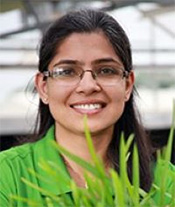Index
Ambika Chandra, Ph.D.

Ambika Chandra, Ph.D., is an Associate Professor of Turfgrass Breeding and Genetics at Texas A&M AgriLife Research in Dallas, Texas. She earned her bachelor’s in agriculture and master’s in plant breeding and genetics from Punjab Agricultural University, Ludhiana, India working on wide hybridization in Brassica spp. She earned her Ph.D. in Agronomy from The Pennsylvania State University working on deciphering the molecular mechanism behind pistil smut induced development of female sex organs in flowers of male buffalograss (induced hermaphroditism). Chandra joined Texas A&M AgriLife Research in September, 2007. Her current research interest is breeding (applied and molecular) and cultivar development of warm- and cool-season turfgrass species for use in home lawns, athletic fields and golf courses. Her research focuses on the development and characterization of turfgrass germplasm adapted to changing climate conditions including recurrent drought stress and extreme temperature variation. This involves adopting holistic systems approach towards cultivar development, marketing and commercialization through industry collaborations, and working in interdisciplinary areas of turfgrass science. Her research has produced four plant varieties: TamStar, an embryo rescue derived interploid hybrid and a drought tolerant St. Augustinegrass; KSUZ 0802, Z. matrella x Z. japonica hybrid zoysiagrass with improved cold tolerance and fine texture; DALZ 1308, Z. matrella x Z. minima greens type hybrid zoysiagrass; and DALBG 1201, a Texas bluegrass x Kentucky bluegrass hybrid with improved performance under shade, heat and drought stress. In addition, she has authored 35 refereed journal articles, one plant patent (with three pending), and 18 popular press publications. Chandra has served on the scientific review panel for the USDA-NIFA, and has been awarded the Editor’s Citation for Excellence award for her outstanding professional contribution in the oversight of manuscript reviews for Crop Science.
Presenting